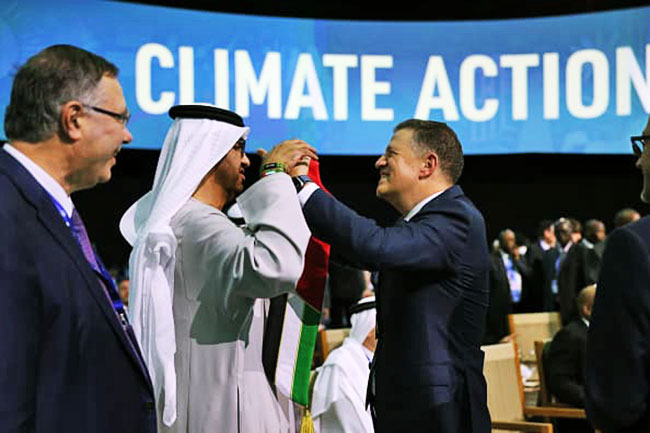|
by Sam Meredith
from
CNBC Website
Majid Jafar, chief executive officer of Crescent Petroleum Co., right, gives Sultan Ahmed Al Jaber, chief executive officer of Abu Dhabi National Oil Co. (ADNOC) and president of COP28, center, a scarf in the colors of the United Arab Emirates national flag during the Summit on Methane and Other Non-CO2 Greenhouse Gases on day three of the COP28 climate conference at Expo City in Dubai,
United Arab Emirates, on Saturday, Dec. 2, 2023.
The chief executive of UAE-based energy firm Crescent Petroleum on Tuesday claimed that blaming the oil and gas industry for the climate crisis,
His comments come at the mid-point of the U.N.'s biggest and most important annual climate conference, with many at the COP28 talks in Dubai calling for heads of state from nearly 200 countries to agree to a fossil fuel phase out.
The burning of coal, oil and gas is by far the largest contributor to climate change, accounting for more than three-quarters of global greenhouse gas emissions.
Among a flurry of pledges in the first few days of COP28 was a commitment by some 50 oil and gas companies to cut methane emissions from their own operations by 2030.
U.N. Secretary-General António Guterres said that the announcement was,
However, he said the promises made,
Asked about Guterres' comments, Jafar said he believed oil and gas would continue to play a major role in the transition to cleaner energy technologies.
IEA warning to Big Oil
Jafar said he believed it was imperative to produce oil and gas in a "cleaner" way but insisted that countries across the globe will continue to rely on fossil fuel use.
Big Oil's presence at the U.N. climate talks has long been a source of contention, with many sharply critical of the scale of access that fossil fuel lobbyists appear to have each year.
Others, including former U.S. Energy Secretary Ernest Moniz, believe that the participation of energy giants should be welcomed at events such as COP28
The International Energy Agency (IEA) said late last month that the fossil fuel industry faces a "moment of truth" about their role in the global energy system and the climate 'crisis'...
|


